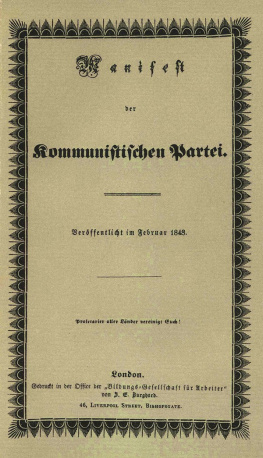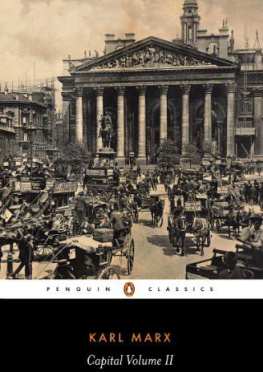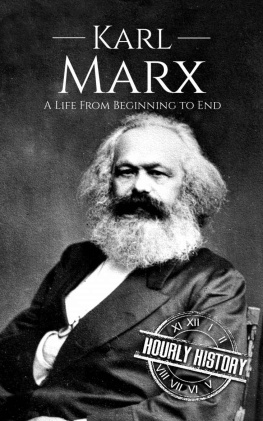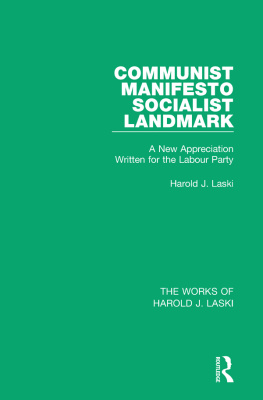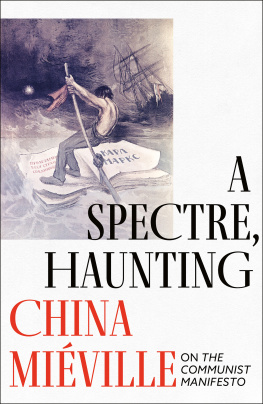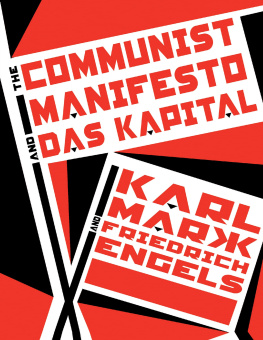Karl Marx - Manifesto of the Communist Party
Here you can read online Karl Marx - Manifesto of the Communist Party full text of the book (entire story) in english for free. Download pdf and epub, get meaning, cover and reviews about this ebook. year: 1848, genre: Politics. Description of the work, (preface) as well as reviews are available. Best literature library LitArk.com created for fans of good reading and offers a wide selection of genres:
Romance novel
Science fiction
Adventure
Detective
Science
History
Home and family
Prose
Art
Politics
Computer
Non-fiction
Religion
Business
Children
Humor
Choose a favorite category and find really read worthwhile books. Enjoy immersion in the world of imagination, feel the emotions of the characters or learn something new for yourself, make an fascinating discovery.
- Book:Manifesto of the Communist Party
- Author:
- Genre:
- Year:1848
- Rating:4 / 5
- Favourites:Add to favourites
- Your mark:
- 80
- 1
- 2
- 3
- 4
- 5
Manifesto of the Communist Party: summary, description and annotation
We offer to read an annotation, description, summary or preface (depends on what the author of the book "Manifesto of the Communist Party" wrote himself). If you haven't found the necessary information about the book — write in the comments, we will try to find it.
Manifesto of the Communist Party — read online for free the complete book (whole text) full work
Below is the text of the book, divided by pages. System saving the place of the last page read, allows you to conveniently read the book "Manifesto of the Communist Party" online for free, without having to search again every time where you left off. Put a bookmark, and you can go to the page where you finished reading at any time.
Font size:
Interval:
Bookmark:
Written: Late 1847;
First Published: February 1848;
Source: Marx/Engels Selected Works, Vol. One, Progress Publishers, Moscow, 1969, pp. 98-137;
Translated: Samuel Moore in cooperation with Frederick Engels, 1888;[German Original];
Transcription/Markup: Zodiac and Brian Baggins;
Proofed: and corrected against 1888 English Edition by Andy Blunden 2004;
eBook set up: J Eduardo Brissos 2011 & Pablo Stern 2020;
Copyleft: Marx/Engels Internet Archive (marxists.org) 1987, 2000. Permission is granted to copy and/or distribute this document under the terms of the Creative Commons Attribution-ShareAlike License.

Page of the Manifesto in Marx's original handwriting.
| |
| |
The . Into Danish, too, it was translated shortlyafter its appearance.
However much that state of things may have altered during the last twenty-fiveyears, the general principles laid down in the Manifesto are, on the whole,as correct today as ever. Here and there, some detail might be improved.The practical application of the principles will depend, as the Manifestoitself states, everywhere and at all times, on the historical conditionsfor the time being existing, and, for that reason, no special stress islaid on the revolutionary measures proposed at the end of ), although, in principle still correct, yet in practice are antiquated,because the political situation has been entirely changed, and the progressof history has swept from off the earth the greater portion of the politicalparties there enumerated.
But then, the Manifesto has become a historical document which we haveno longer any right to alter. A subsequent edition may perhaps appear withan introduction bridging the gap from 1847 to the present day; but thisreprint was too unexpected to leave us time for that.
Karl Marx & Frederick Engels
June 24, 1872, London
The first Russian edition of the Manifesto of theCommunist Party, translated by Bakunin ]. Then the West could see in it (theRussian edition of the Manifesto) only a literary curiosity. Such a viewwould be impossible today.
What a limited field the proletarian movement occupied at that time(December 1847) is most clearly shown by the : the positionof the Communists in relation to the various opposition parties in variouscountries. Precisely Russia and the United States are missing here. Itwas the time when Russia constituted the last great reserve of all Europeanreaction, when the United States absorbed the surplus proletarian forcesof Europe through immigration. Both countries provided Europe with rawmaterials and were at the same time markets for the sale of its industrialproducts. Both were, therefore, in one way of another, pillars of theexisting European system.
How very different today. Precisely European immigration fitted NorthAmerican for a gigantic agricultural production, whose competition is shakingthe very foundations of European landed property large and small. Atthe same time, it enabled the United States to exploit its tremendous industrialresources with an energy and on a scale that must shortly break the industrialmonopoly of Western Europe, and especially of England, existing up to now.Both circumstances react in a revolutionary manner upon America itself.Step by step, the small and middle land ownership of the farmers, the basisof the whole political constitution, is succumbing to the competition ofgiant farms; at the same time, a mass industrial proletariat and a fabulousconcentration of capital funds are developing for the first time in theindustrial regions.
And now Russia! During the Revolution of 1848-9, not only the Europeanprinces, but the European bourgeois as well, found their only salvationfrom the proletariat just beginning to awaken in Russian intervention.The Tsar was proclaimed the chief of European reaction. Today, he is aprisoner of war of the revolution in Gatchina , and Russia forms the vanguardof revolutionary action in Europe.
The Communist Manifesto had, as its object, the proclamation of theinevitable impending dissolution of modern bourgeois property. But in Russiawe find, face-to-face with the rapidly flowering capitalist swindle andbourgeois property, just beginning to develop, more than half the landowned in common by the peasants. Now the question is: can the Russian obshchina,though greatly undermined, yet a form of primeval common ownership ofland, pass directly to the higher form of Communist common ownership? Or,on the contrary, must it first pass through the same process of dissolutionsuch as constitutes the historical evolution of the West?
The only answer to that possible today is this: If the RussianRevolution becomes the signal for a proletarian revolution in the West,so that both complement each other, the present Russian common ownershipof land may serve as the starting point for a communist development.
Karl Marx & Frederick Engels
January 21, 1882, London
The preface to the present edition I must, alas,sign alone. Marx, the man to whom the whole working class of Europeand America owes more than to any one else rests at Highgate Cemeteryand over his grave the first grass is already growing. Since hisdeath [March 14, 1883] , there can be even less thought of revising or supplementingthe Manifesto. But I consider it all the more necessary again to statethe following expressly:
The basic thought running through the Manifesto that economicproduction, and the structure of society of every historical epoch necessarilyarising therefrom, constitute the foundation for the political and intellectualhistory of that epoch; that consequently (ever since the dissolution ofthe primaeval communal ownership of land) all history has been a historyof class struggles, of struggles between exploited and exploiting, betweendominated and dominating classes at various stages of social evolution;that this struggle, however, has now reached a stage where the exploitedand oppressed class (the proletariat) can no longer emancipate itself fromthe class which exploits and oppresses it (the bourgeoisie), without atthe same time forever freeing the whole of society from exploitation, oppression,class struggles this basic thought belongs solely and exclusively toMarx.
I have already stated this many times; but precisely now is it necessarythat it also stand in front of the Manifesto itself.
Frederick Engels
June 28, 1883, London
The Manifesto was published as the platform ofthe Communist League, a working men s association, first exclusively German,later on international, and under the political conditions of the Continentbefore 1848, unavoidably a secret society. At a Congress of the League,held in November 1847, Marx and Engels were commissioned to prepare a completetheoretical and practical party programme. Drawn up in German, in January1848, the manuscript was sent to the printer in London a few weeks beforethe French Revolution of February 24. A French translation was broughtout in Paris shortly before the insurrection of June 1848. The first Englishtranslation, by Miss Helen Macfarlane, appeared in George Julian Harney sRed Republican, London, 1850. A Danish and a Polish edition hadalso been published.
The defeat of the Parisian insurrection of June 1848 the first greatbattle between proletariat and bourgeoisie drove again into the background,for a time, the social and political aspirations of the European workingclass. Thenceforth, the struggle for supremacy was, again, as it had beenbefore the Revolution of February, solely between different sections ofthe propertied class; the working class was reduced to a fight for politicalelbow-room, and to the position of extreme wing of the middle-class Radicals.Wherever independent proletarian movements continued to show signs of life,they were ruthlessly hunted down. Thus the Prussian police hunted out theCentral Board of the Communist League, then located in Cologne. The memberswere arrested and, after eighteen months imprisonment, they were triedin October 1852. This celebrated Cologne Communist Trial lasted fromOctober 4 till November 12; seven of the prisoners were sentenced to termsof imprisonment in a fortress, varying from three to six years. Immediatelyafter the sentence, the League was formally dissolved by the remaining members.As to the Manifesto, it seemed henceforth doomed to oblivion.
Font size:
Interval:
Bookmark:
Similar books «Manifesto of the Communist Party»
Look at similar books to Manifesto of the Communist Party. We have selected literature similar in name and meaning in the hope of providing readers with more options to find new, interesting, not yet read works.
Discussion, reviews of the book Manifesto of the Communist Party and just readers' own opinions. Leave your comments, write what you think about the work, its meaning or the main characters. Specify what exactly you liked and what you didn't like, and why you think so.

